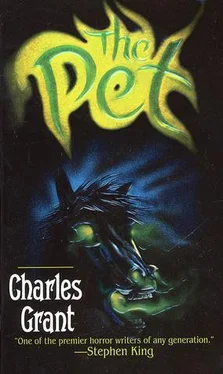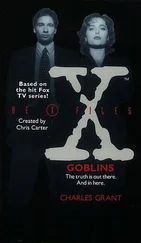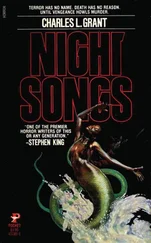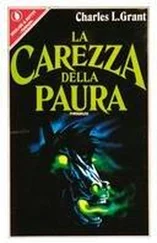Which way? Oh Jesus, which way?
There was no escaping, but there could be stalling, long enough, she hoped, for Don to understand and come after her. And the only place she knew that he would think of right away …
With a shriek of hatred at the charging animal, and despair for leaving Jeff, she let the wind push-shove her across the lane and past the wall. Into the park where half the lights had been knocked out. Running toward the pond where the water slapped over the sides.
He ran.
Slapping the rain from his face, ignoring the puddles that grew into lakes, Don ran toward the center of town. It occurred to him Jeff might have taken her home, but he couldn’t be sure. By now Tracey knew it was after her, and she wouldn’t want any of her family hurt. And there was no place else to go where she was sure he would follow — she had to be at the park, waiting if she were still alive.
He scowled and punched his chest. He couldn’t think like that or it was over; he had to know she was alive and somehow avoiding the stallion. Maybe in the trees where it might not be able to maneuver so well; maybe along the wall to keep it between them. But she was alive. She had to be alive. What the hell would be the sense if that damned thing got her?
At home, though, was her father, and her father’s gun. He didn’t know what could stop it, if anything could, but Tracey would have to be thinking of a weapon to defend her, and the best one would be where her father’s guns were kept.
Oh, Christ , he thought; make up your mind!
Stop , he yelled then, without moving his lips; stop, don’t do it, it’s Tracey and I didn’t mean it!
If it heard his hurt, it must hear his pleading; if he was in control, it couldn’t not obey. Unless, under the new rules, it protected without question.
Oh, Christ , he thought; make up your damned mind!
He wasn’t going fast enough. He would never be able to outrun Jeff’s car, or outrun the horse. He had to stretch out, he had to reach, he had to beat the wind to wherever he was going.
He was going too fast and he was going to slip and break a leg if he wasn’t more careful; he was going to run out of steam and be too late if he didn’t pace himself like always.
A race, he told himself; a race, and there they are, looking out their windows watching, cheering silently, waving flags and tooting horns as he swept under awnings, went with the wind instead of trying to fight it, his sneakers splashing a wake behind him, his arms cutting through the cold rain to give him room to move.
They were cheering because he was Don Boyd, and he was going to make it.
He fell.
The curb was under several inches of water backed up from a storm drain, and he misjudged the edge. His hands raked along the blacktop, the knees of his jeans tore open and spilled blood into the street. He whimpered, and cursed, and kept pushing himself forward until he was on his feet again.
Running.
In silence.
The windows were empty, there were no crowds watching, there were no bands or hurrahs or photographers waiting along the route that had him swerve into the street, using the parked cars now to push him with a slap of his hand, wondering where the traffic was, dodging around an Ashford Day banner stripped from its mooring and flapping in the street feebly where tomorrow there’d be a parade.
Running.
In silence.
Tempted to swing into the Quinteros‘ neighborhood, just in case he was wrong, sobbing when he realized he had no time for a choice; the park, or Tracey’s house, and if he made a mistake, somebody would die.
She sprinted into the oval, knowing enough not to look behind her in case she lost ground. A globe flickered and went out. The rain was stained silver. She tried to veer around the pond, but the leaf-coated apron shifted under her feet and she went down on her shoulder. Screaming. Writhing. Almost welcoming the dark cloud that crested and settled over her. At least it would dull the pain; at least it would keep her from seeing herself die.
But the cloud lifted and the rain woke her, and she leaned on one hand and looked down the path.
It was there.
Standing in the entrance, oblivious to the storm, head and flanks shining as if coated in thin ice.
Panting against the wind that stole the breath from her mouth, she staggered to her feet and let the wind push her backward. On either side the trees waited, yet she couldn’t stop herself from looking as the stallion began to move, legs slowly lifting, head slowly bobbing, the greenfire from its hooves lighting its way.
The park.
It had to be the park, and he didn’t know why, and he was close to weeping as he ran past Beacher’s, past the theater, and saw Lichter’s car canted on the island.
He slowed as he swung up to the wreck and saw Jeff lying on the front seat and Tracey nowhere in sight. He apologized to his friend by touching the window as if he were touching his hand, then veered sharply across the lane and ran through the gates.
The oval was ahead, and he tried to call out, but there was nothing left in his lungs but the air that moved his legs, pumped his arms, dried his throat as he opened his mouth to find one more breath to keep him from stopping.
And once there, it was empty.
He staggered and slowed when the sodden leaves threatened to spill him, his arms out for balance until he reached the path again.
Then he stopped.
He looked back.
He called Tracey’s name, hands cupped around his mouth, eyes blinking at the rain that tore through the branches and ran down his back, his chest, filled his sneakers, and made him still with the cold.
Half sideways, he began to run toward the field, always checking behind in case he had missed her. Calling. Demanding. Spinning around at a flare of lightning and seeing her sprawled on the ground … seeing the stallion beside her, teeth bared and hooves pawing.
“No!” he screamed, and Tracey turned and saw him.
“No!” he screamed, and the stallion swung its head around.
He stumbled and flailed across the muddied field, shaking his head and stretching his hand out toward her without taking his eyes from the horse that backed away.
greenfire and greeneyes and fog lifting to the storm at his approach.
Tracey got to her feet and fell against him when he reached her, but he shoved her behind him when the stallion lifted its head high.
“No,” he said, a palm out to stop it.
Its head, higher; its rear legs slightly bent.
“No!” he shouted, both hands out now as it lifted itself off the ground, its forelegs outstretched and the greenfire that sparked from them crackled through the rain.
“No!” he screamed. “No! Go away!”
Greeneyes so narrowed they nearly vanished in the fog.
“I don’t need you!” Don screamed as the stallion rose higher. “I don’t need you, goddamnit! Just … just leave me alone!”
Higher still, and blacker.
“Goddamnit! Goddamnit! Leave me alone!”
Higher until Don dropped to his knees, hands out, eyes raging, feeling the blood rush to his face feverish and stinging.
Tracey buried her face in his back.
He screamed again, and again, swinging his arms back and forth to counter the thick mist that poured from the stallion and obscured the greenfire, buried the greeneyes, suddenly scattered like a window shattered by the wind.
Don cowered away from it with a gasp at the touch of its dead cold, shifted, and threw his arms protectively around Tracey. She hugged him tightly, desperately, and they watched as best they could while the storm took over, the rain penetrated the fog and finally pummeled it to the ground.
And when it was gone, they were alone; the stallion was gone.
Читать дальше












